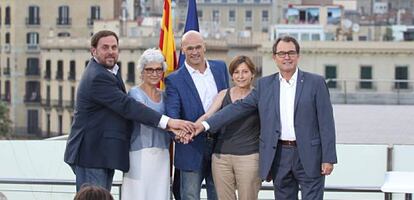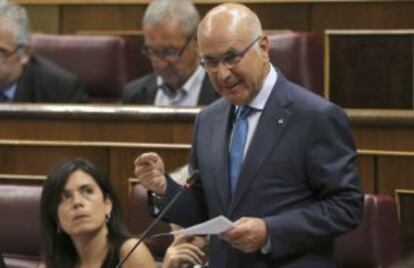Catalan secessionists threaten immediate independence after election
But former government partner says premier Mas is being dragged into sovereignty process

The leaders of the pro-sovereignty bloc that hopes to win the Catalan regional election on September 27 warned that they are ready to declare independence immediately after the ballot if Madrid tries to place any legal hurdles in their way.
Regional premier Artur Mas, who is leading the secession drive, had originally talked about a six-to-eight-month period before declaring independence following his bloc’s hypothetical victory in the regional election.
Although voters are officially just electing the next Catalan premier, Mas and his team are presenting it as a de facto referendum on independence. A bid to hold a real referendum last year was blocked by the central government.
Last week, Spanish Prime Minister Mariano Rajoy said there would be no Catalan independence no matter what nationalist leaders are promising
An informal plebiscite held on November 9 yielded a majority support for independence, but offered little credibility to legal experts and outside observers because of the way it was organized.
Now, pro-independence forces have regrouped into a bloc called Junts pel sí (Together for Yes) comprising two political parties – Mas’s Democratic Convergence of Catalonia (CDC) and Oriol Junqueras’s Catalan Republican Left (ERC) – and civic associations. Together, they hope to inspire renewed support for the secession bid following several months of dwindling support in opinion surveys.
Deeply divided
But Catalan nationalism is deeply divided over the issue of independence. On Monday, Josep Antoni Duran Lleida, a leading figure of Democratic Union of Catalonia (UDC), which was CDC’s partner in government for nearly 37 years as CiU, said that Artur Mas is letting himself get “swept away by ERC and secessionist entities.”
“They’ve put us in a pickle and now we have to get out of it without flouting the law,” said Duran, who defended the need for dialogue and rejected the unilateral declaration of independence championed by Mas.
His UDC party will run as an alternative to the secessionist bloc after CiU broke up last month over the issue. (SEE BOTTOM BOX)
No turning back
The Junts pel si bloc was officially presented on Monday at the Catalan History Museum in Barcelona, where top candidate Raül Romeva, a former eco-socialist representative in the European Parliament, warned that they are quite earnest about declaring independence.
“We are completely serious about this, and everyone needs to understand that we’re going to do it,” he said. “We’ve tried every other way but they didn’t let us. This is the chance to do what we couldn’t do on November 9 and obtain a democratic mandate.”
Despite their high profile, Mas and Junqueras are running fourth and fifth on the Junts pel sí list and leaving two of the three top spots to the former heads of ANC and Òmnium Cultural, two pro-independence civic associations.
By bringing this social element to the Junts pel si bloc, its leaders hope to contain the leftist coalition of four parties, including Podemos, which are running in the election under the name Catalunya sí que es pot (loosely, Catalonia, yes we can).
At the presentation, bloc leaders talked about the steps they want to take if they secure an absolute majority on September 27 – even if those steps clearly clash with the Spanish Constitution.
The first step, said Romeva, would be for the Catalan parliament to declare the beginning of the secession process. After that, the legislature would give the executive the power to activate “state structures.” The third step would be to draft a Catalan Constitution “from the bottom up, with citizen participation,” and after voting on it, there would be a formal declaration of independence. Within 18 months, the government would dissolve and new constituent elections called.

This would be the beginning of what secessionist leaders call the “disconnect” with Spain. “We are aware of the risks involved and also of the opportunities,” said Romeva. “They won’t make it easy for us."
But if Spain blocks the process, there will be an immediate declaration of independence.
“In the event that the Spanish state, through political and or legal decisions, should block Catalonia’s self-government, the [Catalan] government and parliament will proceed to proclaim independence and approve the judiciary transitional law,” said Romeva.
Last week, Spanish Prime Minister Mariano Rajoy said there would “be no Catalan independence, and Catalonia is not going to leave Spain or Europe, even though this is what’s being offered to citizens there right now.”
English version by Susana Urra.
Strange bedfellows?
At the Junts pel sí presentation, Raül Romeva admitted that the pro-sovereignty bloc was "odd," a reference to the fact that it brings together CDC and ERC, which until recently had vowed to run separately in the election, partly due to disagreements over a number of issues. Until now, CDC's natural partner had been the Democratic Union of Catalonia (UDC). Together, the CiU coalition ruled Catalonia almost uninterruptedly for 37 years, first under longtime premier Jordi Pujol, then, since 2010, under current premier Artur Mas.
But last month, the partners announced that they were breaking up, chiefly because UDC refused to support the Catalan independence project any longer. Although both parties share a nationalist vision of Catalonia, UDC holds more moderate views that fall short of independence.
The Junts pel sí list has also attracted former Barça coach Pep Guardiola, who has no intention of taking up a deputy's seat if the bloc wins the election, but wants to lend his weight to the cause.
Tu suscripción se está usando en otro dispositivo
¿Quieres añadir otro usuario a tu suscripción?
Si continúas leyendo en este dispositivo, no se podrá leer en el otro.
FlechaTu suscripción se está usando en otro dispositivo y solo puedes acceder a EL PAÍS desde un dispositivo a la vez.
Si quieres compartir tu cuenta, cambia tu suscripción a la modalidad Premium, así podrás añadir otro usuario. Cada uno accederá con su propia cuenta de email, lo que os permitirá personalizar vuestra experiencia en EL PAÍS.
En el caso de no saber quién está usando tu cuenta, te recomendamos cambiar tu contraseña aquí.
Si decides continuar compartiendo tu cuenta, este mensaje se mostrará en tu dispositivo y en el de la otra persona que está usando tu cuenta de forma indefinida, afectando a tu experiencia de lectura. Puedes consultar aquí los términos y condiciones de la suscripción digital.








































